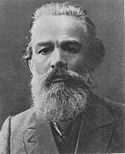- Dimitar Blagoev
-
Dimitar Blagoev Nikolov (Bulgarian: Димитър Благоев Николов); (June 14, 1856 – May 7, 1924) was a Bulgarian political leader,[1][2][3] the founder of Bulgarian socialism and of the first social democratic party in the Balkans.[4]
Biography
Blagoev was born in the village of Zagorichani in the region of Macedonia (today Vasiliada in Agioi Anargyroi, Kastoria, Greece), at that time part of the Ottoman Empire.[5] In his youth he was influenced by the atmosphere of the Bulgarian National Revival. He learned consequently in Bulgarian Exarchate's schools in Tsarigrad (1873-1874), Adrianople (1874-1875), Gabrovo (1875-1876) and Stara Zagora (1876-1877), where during the Russo-Turkish War, he wellcomed the Opalchentsi and the Russian Army.[6] Later he studied at the Odessa Realschule from 1878 to 1880. He became involved in public activities in the early 1880s, while a student at Saint Petersburg University in Russia. In the Russian capital he matured with Marx and while still under the influence of populist ideas and those of Proudhon and Lassale. Blagoev created the first social democratic group in Russia, called a party, with its press organ, the "Rabochii" (Worker) newspaper.
Extradited in 1885 by the Russian government, Blagoev returned to Bulgaria, settled in Sofia and began to propagate socialist ideas. In July 1891 on the initiative of Blagoev, the social democratic circles of Tyrnovo, Gabrovo, Sliven, Stara Zagora, Kazanlyk and other cities united to form the Bulgarian Social Democratic Party (BSDP). The marxist nucleus of the BSDP was opposed by a group, who were essentially opposed to making the social democratic movement into a party. In 1893 this group, led by Yanko Sakazov, founded a reformist organization, the Bulgarian Social Democratic Union. In 1894, Blagoev’s supporters agreed to unite with the Unionists in the interests of working class unity and took the name Bulgarian Social Democratic Workers Party. He was a founder of the became the leader of its left wing, which split from the BSDWP in 1903 to found the Bulgarian Social Democratic Workers' Party (Narrow Socialists).[7] Under his guidance the foundations of the class trade-union movement was laid in 1904. From 1897 to 1923 Blagoev directed the publication of the party’s theoretical organ, the journal "Novo vreme", which published more than 500 of his articles. Meanwhile he worked as teacher in different cities in Bulgaria. In 1905, Blagoev translated into Bulgarian the first volume of Das Kapital and a number of other works by Marx. Blagoev’s book "From the History of Socialism in Bulgaria" was published in 1906 and it book initiated Bulgarian Marxist historiography. He led the delegations of narrow socialists at the Balkan socialist conferences in Belgrade (1910) and Bucharest (1915).
He was against foreign intervention by the Great Powers in Southeast Europe, believed in a Balkan Federative Republic and opposed Bulgaria's military engagements in the Second Balkan War and First World War. A deputy to the National Assembly of Bulgaria, Blagoev voted in October 1914, along with the rest of the faction of narrow socialists, against war credits. During World War I as deputy Blagoev exposed "the war’s imperialist nature and the traitorous role of the Second International". Blagoev hailed the Russian October Socialist Revolution and propagandized for the ideas of the Bolsheviks. Under his leadership the Narrow Socialist party broke with the Second International. In 1919 the party joined the Communist International and became the Bulgarian Communist Party with Blagoev at its head. However, during this period Blagoev and the party as a whole did not completely adopt Bolshevik's positions on the basic questions. This determined the party’s policies during the Vladaya Soldiers’ Rebellion of 1918 and the military coup of June 9, 1923, when the party adopted a position of neutrality. He was also an opponent of the failed September Uprising and thought that there were no ripe conditions for a revolution in Bulgaria yet.
Blagoev was also author of a number of research essays on questions of Marxist philosophy, political economy, history, esthetics, and Bulgarian literature. He died in Sofia, Bulgaria.
The city of Gorna Dzhumaya in today's Blagoevgrad Province in Bulgaria was named after him Blagoevgrad.
Gallery
Notes
- ^ The formation of labour movements, 1870-1914: an international perspective, The Formation of Labour Movements, 1870-1914: An International Perspective, Jürgen Rojahn, ISBN 9004092765, BRILL, 1990, p. 403.
- ^ Religion and power in Europe: conflict and convergence, Joaquim Carvalho, Edizioni Plus, 2007, ISBN 8884924642, p. 263.
- ^ An introduction to post-communist Bulgaria: political, economic, and social transformations, Emil Giatzidis, Manchester University Press, 2002, ISBN 0719060958, p. 18.
- ^ Entangled paths towards modernity: contextualizing socialism and nationalism in the Balkans, Augusta Dimou, Central European University Press, 2009, ISBN 9639776386, pp.185-190.
- ^ Biographical dictionary of European labor leaders, A. T. Lane, ISBN 0313264562, Greenwood Publishing Group, 1995, ISBN 0313298998, pp. 98-99.
- ^ София Василева, © Електронно списание LiterNet, 10.10.2006, № 10 (83) Историческите стенописи в старозагорската църква "Св. Димитър".
- ^ History of the Balkans: Twentieth century, Joint Committee on Eastern Europe publication series, Barbara Jelavich, Cambridge University Press, ISBN 0521274591, p. 138.
Categories:- 1856 births
- 1924 deaths
- People from Kastoria
- Bulgarians from Aegean Macedonia
- Bulgarian Social Democratic Workers' Party politicians
- Bulgarian communists
- Modern history of the Blagoevgrad Province
- Ottoman-era Macedonia (Greece)
- Bulgarian politician stubs
Wikimedia Foundation. 2010.




